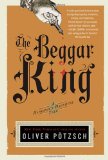Summary | Excerpt | Reviews | Beyond the Book | Read-Alikes | Genres & Themes | Author Bio

 Book Reviewed by:
Book Reviewed by:
Cindy Anderson
Buy This Book
This article relates to The Beggar King
 Oliver Pötzsch spent his early years in Bavaria, listening to stories about his family from his grandmother. He says that when he was five or six, she told him that he was a direct descendant of a family named Kuisl, who were employed as executioners. He was too young then to even know what an executioner did, but it sparked a curiosity in him that never left (The Hangman's Daughter, postscript).
Oliver Pötzsch spent his early years in Bavaria, listening to stories about his family from his grandmother. He says that when he was five or six, she told him that he was a direct descendant of a family named Kuisl, who were employed as executioners. He was too young then to even know what an executioner did, but it sparked a curiosity in him that never left (The Hangman's Daughter, postscript).
Using this history as a starting point, Pötzsch began creating a fictional world for Jakob Kuisl, and studying the history of Schongau as well as the role of the hangman. His aim is "to stick to the facts as much as possible. In that, he doesn't disappoint. His depiction of the Kuisls as well-read, and knowledgeable about healing come straight from the family records, which included physical descriptions and family traits shared by all of the Kuisls. These include a tendency towards introversion and alcoholism, which are reflected in the fictional Jakob, as well as in his father.
The Life of an Executioner
Most executioners in 17th century Europe were trained professionals who were paid for their services, and who learned and inherited the job from their fathers. Once they were "official," they could not be charged with murder in the course of doing the job. Because business might be too slow in a single town, an executioner often worked for several surrounding communities, or as a "traveling" executioner.
 As torture was part of the job, the executioner had to understand, if only in layman's terms, quite a lot about how the human body worked. An order to inflict pain without killing the individual was common when the goal was to obtain a confession. If the first attempt was unsuccessful, the torturer might have to tend to some of the damage he had inflicted so that the prisoner would not die, and they could start afresh on the following day. For this reason, many executioners were healers as well. Pötzsch 's research found that his ancestors were well known to the area as healers; apparently there were plenty of people willing to overcome their fear, and go to the executioner for medical help. A torturer was also not above providing an accused person with something to ease pain during their torture or execution, especially if he thought the victim was innocent.
As torture was part of the job, the executioner had to understand, if only in layman's terms, quite a lot about how the human body worked. An order to inflict pain without killing the individual was common when the goal was to obtain a confession. If the first attempt was unsuccessful, the torturer might have to tend to some of the damage he had inflicted so that the prisoner would not die, and they could start afresh on the following day. For this reason, many executioners were healers as well. Pötzsch 's research found that his ancestors were well known to the area as healers; apparently there were plenty of people willing to overcome their fear, and go to the executioner for medical help. A torturer was also not above providing an accused person with something to ease pain during their torture or execution, especially if he thought the victim was innocent.
The hangman's job obviously was not for the faint of heart. It was physically and psychologically exhausting, and emotionally draining. Like Jakob Kuisl's father, these men were often driven to depression and drink because of the nature of the job. On top of this, they were feared and shunned by the public, considered to be bad luck. No one wanted to cross paths with an executioner. For this reason, the children of hangmen usually married those from other hangmen families, or within their own extended family.
By the end of the 18th century, many countries had abolished judicial torture and were outlawing certain methods of execution. Pötzsch notes that when this occurred, his family, like other hangmen families at the time, turned their talents to the practice of medicine. In fact, many members of Pötzsch's immediate family are doctors; he calls himself the "Black Sheep" for having pursued writing instead.
Picture of Schongau from wikipedia.org
Picture of sword from swordsandarmor.wordpress.com
Filed under Cultural Curiosities
![]() This article relates to The Beggar King.
It first ran in the February 6, 2013
issue of BookBrowse Recommends.
This article relates to The Beggar King.
It first ran in the February 6, 2013
issue of BookBrowse Recommends.





The Funeral Cryer by Wenyan Lu
Debut novelist Wenyan Lu brings us this witty yet profound story about one woman's midlife reawakening in contemporary rural China.
Your guide toexceptional books
BookBrowse seeks out and recommends the best in contemporary fiction and nonfiction—books that not only engage and entertain but also deepen our understanding of ourselves and the world around us.